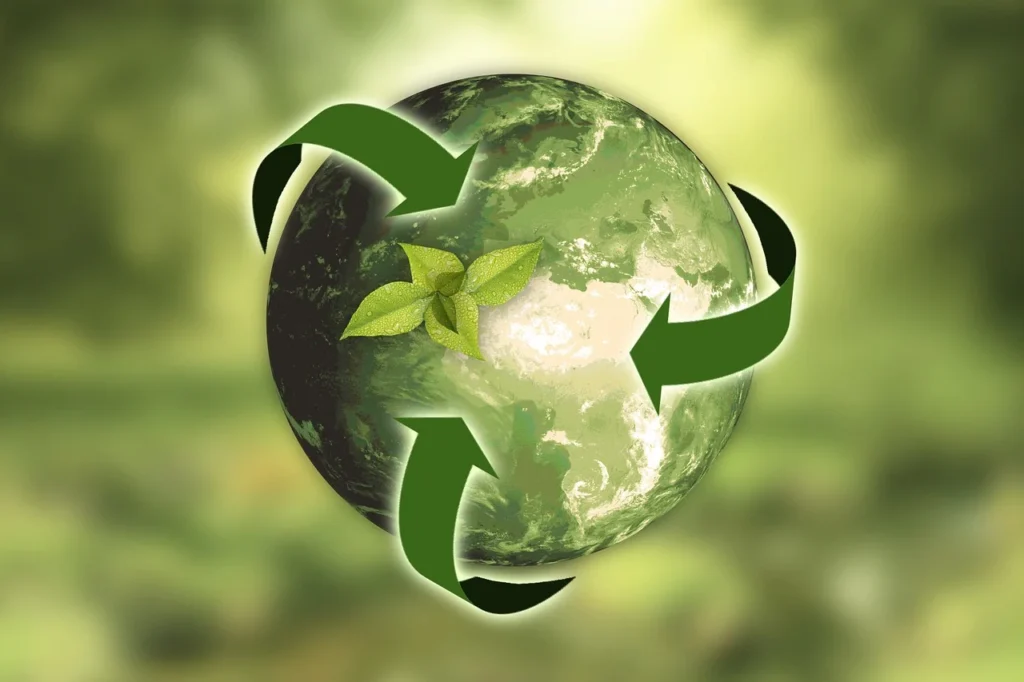
How Do You Define ‘Sustainability’?
I just had an Aha! moment about what’s the problem with sustainability. Consequently, I saw how that “problem” can be fixed instantly. Because that problem does not lie in nature. The ‘problem’ is how we define sustainability.
This is the current (2009) Wikipedia definition and by design, it’s the current definition of the collective humanity:
“Sustainability, in a broad sense, is the capacity to endure. In ecology, the word describes how biological systems remain diverse and productive over time. For humans it is the potential for long-term maintenance of wellbeing, which in turn depends on the wellbeing of the natural world and the responsible use of natural resources.” (Wikipedia)
Additionally, this is a widely popular theory in business schools:
“When applied to business, [sustainability] refers to the ability of an organization to stay profitable over a long period.”
Earlier, I defined sustainability in Triple Bottom Line’s January/February issue, in the feature ‘How Collaboration Can Save the Planet – And Your Business’, as follows:
“Everything on this planet is part of a cycle of birth-death-regeneration. There is a water cycle, a carbon cycle, a consumption cycle. Money, too, revolves. It is spent-earned-spent. A cycle is a complete loop. The very definition of “un-sustainability” is an incomplete loop – a cycle broken by excess (accumulation) or by withholding (depletion).
Simply defined: Sustainability is “the act of elements revolving in an effortless cycle.”
(Ramala Hubb’Allah’s definition)
The Problem? TIME!
Comparing the aforementioned definitions, the problem with popular definitions of sustainability stands up like a prickly cactus thorn to attention: The problem with popular definitions of sustainability is that they are time-based.
‘Forever’ is not what sustainability is. Sustainability has nothing to do with time. Sustainability has to do with the “ability to sustain”.

The Two Tyrannies of Time
There are two natural, contrary outcomes of time-based definitions, both of which justify my suggestion of giving up the notion of relating sustainability with time:
1. Short-Term Gratification
The justification of short-term behavior. Because that would be the rational thing to do for those who sincerely cannot perceive what 10, 100, or a 1,000 years mean. Short-term behavior makes sense. Greed and fear are the consequences of a focus on “time”.
2. Long-Term Tradition
The preservation of tradition for the generations to come. This is the opposite of short-term behavior. In this scenario, people take a “higher path” – apostrophes intended – and decide to create a way for how their children, grandchildren, and their generations will live henceforth. They attempt to create a perfect system. In remote geographic locations, they can – because newcomers do not visit them. In accessible geographic locations, they become adamant traditionalists. “Our ancestors perfected a way of living,” the subsequent generations will say, “and it cannot be changed. It is the way of life.”
All “ways” of life have an expiration date, after which they become extinct, or they evolve. Only ‘life’ itself sustains, not one way or another. Life is the phenomenon of the change of ways, and yet the continuation of existence.
In sum, this concern with longevity and perennial ways and “the forever” leads to oppression. Because oppression is the only way that an outdated way can be granted life beyond its natural time.
Whether it’s the short term, or the long term – both are tyrannical, fundamentally harmful at any given time, and inappropriate. More importantly, they take attention away from what the purpose, mission and outcome of sustainability is: Giving.
Giving forth, yielding, nourishing, handing over to the Other. Sustaining the Other (and the Other reciprocates).
What Does It Mean “to Sustain”?
This is the definition of the word ‘sustain’ found in the Merriam-Webster online dictionary:
- To give support or relief to
- To supply with sustenance: nourish
- Keep up, prolong
- To support the weight of
- To buoy up. For example, sustained by hope
- To bear up suffer, undergo
- To support as true, legal, or to allow or admit as valid
- To support by adequate proof: confirm
Of these eight definitions, only the third definition has to do with the notion of time. Other online dictionaries have additional definitions. For instance, the Free Dictionary adds:
“To support the spirits, vitality, or resolution of; encourage.”
Dictionary.com has a definition that elaborates upon this in a way that the concept of ‘time’ is removed:
“To keep up or keep going, as an action or process: for example, to sustain a conversation.”
Another interesting definition is:
“To support the spirits, vitality, or resolution of; encourage.”
Hence, since the 13th century, the word ‘sustain’ has centered on the single concept of giving.
Sustain-ability is enabling a system to be continuously, cyclically giving.
This improves, also, upon the way I understood sustainability earlier. Sustainability is still “the act of elements revolving in an effortless cycle”. “Enabling continuous giving” only looks at it from another angle. Which is, “What can we do to make this happen?” In other words, it grants humans (observers) will, power, and autonomy.
We need to answer this question because we ask this question. We ask this question because we are humans. We are sentient. And we want to do something.
Experiencing Sustainability: Two Somatic Exercises
Sustainability is not ‘linear’ and it is not time-based. It is ‘cyclic’, it is right now. The best way to understand it may be to visualize it. Stand in a space, literally or mentally, and imagine these two scenarios:

1. You are standing in the middle of a long, wide road. Visualize yourself as a spot somewhere on this line, which represents a road. You are a spot traveling down the long road, having already traveled a long distance which is now behind you.

2. You are standing in a field. Extend both your hands outwards, spin, and imagine the whole, wide world around you. Right now. A big, round circle, radiating outwards from you. Feel free to imagine yourself to be the queen or king of the world.
.
.
.
How do these two opposing scenarios make you feel?
It is when we experience that whole, big, circular nature of the elements of life, of the whole world, in one instant – as in the second imagery – that we begin to understand the nature of sustainability. When you perceive the world in this way, you will want the entire world to do well, because it will be your world.
This still requires work. It requires giving and contribution. It requires personal character and benevolence to live in such a world. It requires the ability to truly accept responsibility. It is also about experiencing the abundance of life, in the now. To think of ourselves is not to think of ourselves in terms of taking from others, but in terms of giving.
Sustainability is Harmony
If a major trouble with the world today is due to errant human behavior, then this implies that corrected human behavior shall prevent, stop, and in instances even reverse the damage. Indeed, we can look forward to a harmonious coexistence.
When we get out of obstructing the cycles of nature, eliminate our time-based fears and thereby let go of our greed and fear, let things be and learn to live with the vast, thriving, abundant planet – then we shall be able to hold it up. To nurture ourselves and our fellow elements on the planet. To partake in supporting the weight of existence as animals, plants and mountains and rivers have been doing far before humans first appeared on the planet.
To, in short, sustain the other and thus sustain our selves.

One thought on “Why We’re Failing to Sustain – and How Can We Succeed, Right Now (2009)”
Comments are closed.